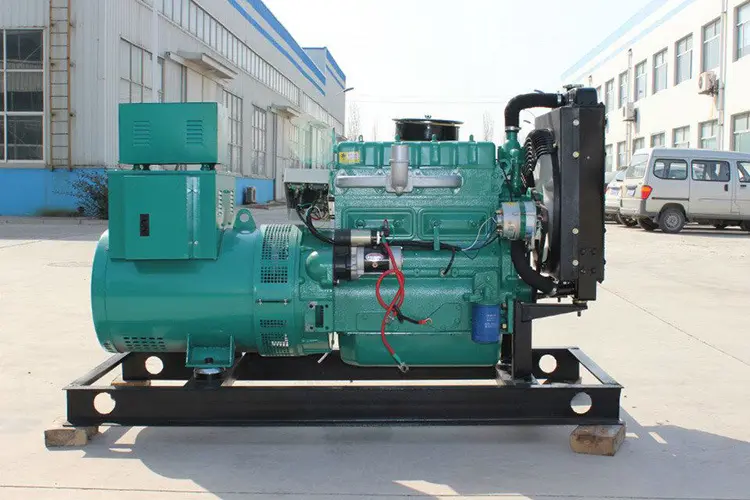Diesel Generator Noise Reduction Strategies and Solutions for a Quieter Operation

Introduction
Diesel generators are widely used across various industries and applications as a reliable source of backup power. However, one of the common challenges associated with diesel generators is the noise they produce during operation. The loud noise generated by diesel generators can be a nuisance for both operators and nearby residents, especially in residential areas or places where noise regulations are strict. In 150kw diesel generator for rural electrification , we will explore the reasons behind diesel generator noise, the impact of noise pollution, and various strategies and solutions to reduce noise levels for a quieter operation.
Understanding Diesel Generator Noise
Diesel generators are known for their robustness and efficiency in providing backup power during outages. However, the internal combustion process in diesel engines produces noise as a byproduct. The primary sources of noise in a diesel generator include:
1. Engine Noise: The combustion of fuel in the engine cylinders generates mechanical noise due to the rapid expansion of gases and the movement of engine components.
2. Cooling System Noise: Diesel generators use cooling systems to maintain optimal operating temperatures. The fans and pumps in the cooling system can contribute to the overall noise output of the generator.
3. Exhaust System Noise: The exhaust system of a diesel generator is responsible for expelling combustion gases. The exhaust pipes and mufflers can generate noise as the gases pass through the system.
4. Vibration Noise: Diesel generators produce vibrations during operation, which can transmit through the structure of the generator and result in additional noise.
Impact of Diesel Generator Noise Pollution
Excessive noise pollution from diesel generators can have various negative impacts on individuals and the environment. Some of the key consequences of diesel generator noise pollution include:
1. Health Effects: Prolonged exposure to high levels of noise can lead to hearing loss, stress, sleep disturbances, and other health issues. Operators and individuals living in close proximity to diesel generators are particularly at risk.
2. Environmental Impact: Noise pollution can disturb wildlife and disrupt ecosystems, especially in natural habitats located near industrial sites or construction areas where diesel generators are commonly used.
3. Legal Compliance: Many jurisdictions have regulations and noise limits in place to protect individuals from excessive noise pollution. Non-compliance with these regulations can result in fines and legal consequences for generator operators.
Strategies for Diesel Generator Noise Reduction
There are several strategies and solutions available to reduce the noise generated by diesel generators and create a quieter operating environment. These strategies can be implemented at different stages, including during the design, installation, and operation of the generator. Some of the key noise reduction techniques for diesel generators include:
1. Soundproof Enclosures: Installing soundproof enclosures around the diesel generator can help contain and absorb noise generated during operation. These enclosures are typically made of acoustic materials that dampen sound waves and reduce noise levels.
2. Vibration Isolation: Using vibration isolation mounts or pads can help reduce the transmission of vibrations from the generator to the surrounding structure, minimizing noise levels. Isolating the generator from the ground or building can also help prevent vibrations from propagating.
3. Exhaust Silencers: Upgrading the exhaust system with high-quality silencers can significantly reduce the noise produced by the diesel generator. Silencers are designed to attenuate the sound of exhaust gases exiting the system without compromising engine performance.
4. Cooling System Optimization: Implementing efficient cooling system designs and using quieter fans and pumps can help minimize noise generated by the cooling system of the diesel generator. Proper maintenance and periodic inspections can also ensure optimal performance with reduced noise output.
5. Remote Monitoring and Control: Implementing remote monitoring and control systems for diesel generators can help operators track performance metrics and adjust settings to optimize operation and reduce noise levels. Automated control systems can also help schedule maintenance tasks for optimal performance.
6. Location and Installation: Proper placement and installation of diesel generators can help mitigate noise propagation to nearby areas. Locating the generator away from sensitive areas, such as residential neighborhoods or quiet zones, can minimize the impact of noise pollution.
7. Regular Maintenance: Performing regular maintenance and inspections on diesel generators can help identify and address potential sources of noise before they escalate. Checking for loose components, worn-out parts, and other issues can prevent excessive noise levels during operation.
8. Noise Barriers and Absorption Panels: Installing noise barriers or absorption panels around the diesel generator can help deflect and absorb sound waves, reducing noise propagation to surrounding areas. These barriers are often made of acoustic materials designed to minimize noise transmission.
9. Soundproofing Materials: Using soundproofing materials such as acoustic foam, soundproof curtains, and sound-absorbing panels can help minimize reverberation and echo within the generator enclosure, further reducing noise levels.
10. Regular Testing and Monitoring: Conducting regular noise level testing and monitoring can help assess the effectiveness of noise reduction measures and identify areas for improvement. Monitoring noise levels over time can also help track changes and ensure compliance with regulatory standards.
Conclusion
Diesel generators play a crucial role in providing backup power in various industries and applications. However, the noise generated by diesel generators during operation can be a significant challenge, leading to health risks, environmental concerns, and legal implications. By implementing effective noise reduction strategies and solutions, generator operators can create a quieter operating environment and mitigate the impact of noise pollution on individuals and the surrounding community. From soundproof enclosures and vibration isolation to exhaust silencers and regular maintenance, there are various approaches available to reduce diesel generator noise levels and promote a more sustainable and responsible operation. By prioritizing noise reduction efforts, generator operators can enhance operational efficiency, comply with regulatory requirements, and contribute to a quieter and healthier environment for all.

